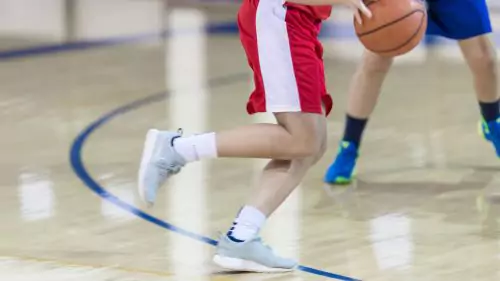When you play your best, there’s a feeling of ease present. You aren’t straining or trying to force anything. What this leads to is natural performances. And natural performances lead to peak performances.
Going off this idea, it may seem beneficial to not be fully focused on what you’re doing. Allowing your mind to wander is helpful…or at least it can be.
But when we’re talking about poor focus, you must remember that you aren’t in that thoughtless flow state. You are still thinking and aware of your focus. It just so happens to be on the wrong thing.
What is Poor Focus
Poor focus occurs when you don’t have much control over your attention during practices and games. Now this attention can be broken down further to say your thoughts. Since it is your thoughts that lead to focus.
Just think about the example of having improperly managed focus due to your focus being fixed on past mistakes. It is your thinking about those past mistakes that leads you to focusing on them.
So, since poor focus is really poor control over your own thinking, we can link it to unhelpful and often hurtful feelings and emotional states caused by the thinking (or poor focus).
Main Ways Poor Focus Holds You Back
Two of the main states are fear and anxiety.
If during a game, or even practice, you focus a lot on what might happen, this will increase feelings of anxiety. Since anxiety in sports is all about worries regarding the future, focusing on the outcome of the game will only drive further feelings of worry.
When you play with anxiety, you play tense, stiff, and often timidly. Not to mention below your potential. You may also find yourself forcing your performance; trying with all your might to will a certain outcome.
All caused by your focus being fixed on the future.
The other main state caused by poor focus is fear. Now this fear can form due to your thoughts drifting into the past or the future.
A common cause of fear in sports is thinking too much about past mistakes. As you do, further mistakes become something to fear.
Now we can see anxiety form in combination with this fear, since you are afraid of making another mistake, and so you worry about how you will play during this game or this practice.
Playing with fear, much like playing with anxiety, leads to tense and timid play. You will likely also feel like you’re holding yourself back. The reason you may hold yourself back is because of the risks associated with playing freely and confidently (or at least the risks you feel).
Because a very interesting part of playing with fear, and also playing with anxiety, is that the more you try to avoid the outcome you don’t want, the more likely you are to make it happen.
In short, when you try not to make mistakes, you increase your chances of making mistakes.
In addition to fear and anxiety, poor focus can also hold you back in other ways. Take focusing too much on your coaches, for example.
If you spend a lot of time thinking about them and how they think you played, this serves as a huge distraction; during games, practices, and also afterwards.
Here we can see social approval form. The more you focus on what they think, the less time you are giving to judging yourself in a positive way and applying tools to increase your own confidence. Instead you are looking to others to increase your confidence.
Poor focus also involves perfectionist thinking, since you are too focused on the outcome – with the outcome being you playing perfectly.
Demanding perfection from yourself is a quick ticket to underperforming. Also, negative thoughts (self-talk) are another block attributed to poor focus. Since if you focus on mistakes, the future, other people, and so on, you put yourself in a vulnerable position to speak negatively to yourself.
Becoming Distracted During Games
All in all, we see many mental game challenges linked to poor focus. That’s how important your focus and your thinking is to your performance.
Once you learn how to manage your focus, many of the mental blocks you experience will be reduced as well.
But it’s not just these mental blocks that are the reason poor focus can lower your level of play. There’s also the plain and simple fact of you becoming distracted.
Whether by the other team, fans, field conditions, thoughts about your personal life or school, or anything else, if your attention is taken away from the game – specifically the task at hand – this can lead to careless mistakes and lower your level of play.
For example, imagine a basketball player at the free throw line. Crowd noise is going to play a major factor in their focus. If they can drown out the noise, fully concentrating on the basket and their shot, their chances of making the shot increase.
Or think about a pitcher in softball. She’s getting ready to deliver a pitch but it’s raining. Can she focus fully on the mit and not worry about the rain? If not, this distraction may lead to a wild pitch, and another one, and another one, a walk, and then being pulled from the game.
So we can see that there are many ways poor focus can hold you back and lower your level of play. Which is why it’s crucial you work on managing your focus and gaining more control over your attention.
To help manage your focus and gain more control over your attention, here’s a video that walks you through a strategy you can use for improving your focus as an athlete.





